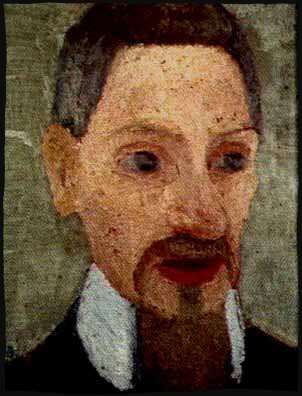
I liked how we used that word in class on Friday, discussing how both Sidney and Shelley's Defenses are rhapsodic in nature. I was intrigued by that beautiful word so i made a note to myself to look it up when I got home. Rhapsodic (dictionary definition): extravagantly emotional. Is it just me or is the literal, dictionary definition sounding pretty poetic there? Extravagantly Emotional. That's how I like my literature! I don't like literature laid out as math: none of these "how does X function in the text" analytical inquiries. I just want to be moved by something extravagantly emotional. Like Sidney, Like Shelley, where the poet is the "great legislator of morality".
One of the great Rhap-ers i've encountered in my literature experience and who has impacted me the most has been the German poet Rainer Maria Rilke, whose prose piece "Letters to a Young Poet" I have returned to time and time again in times of loneliness and anxiety. As I am re-reading the letters right now, the mention of his work in our recent Northrop Frye reading assignment- the anagogic phase- was one of those classic instances of synchronization that seem fall on english majors at least 3 times as often as the average human being. Although, the "Letters" are the only literature by Rilke I have read (so far), it has offered me more comfort and been more valuable to me than anything else they've handed me in school. It is extravagance and exhuberance and emotion: it is poetry as religion, which is why Frye employs him as an example in the anagogic phase, where literature is thought to express the highest spiritual meaning. "Anagogic Criticism is usually found in direct connection to religion, and is to be discovered chiefly in the more uninhibited utterances of the poets themselves" (Frye 122). For Rilke art and poetry are the essence of life. I tried to see if I could figure out exactly which passage in the letters Frye refers to on that same page, 123, where he uses Rilke's idea of the poet "revealing a perspective of reality like that of an angel", and if it is taken out of "Letters to a Young Poet", I think it must be here in the sixth letter, where he advises the young poet to "think, dear sir, of the world you carry within you... be attentive to that which risses up in you and set it above everything" and then, the spiritual revelation of the poet:
"As the bees bring in the honey, so do we fetch the sweetest out of everythingEffectively, the poet builds god, he and god are one. Anagogic may be the only one of the 5 symbolic phases i'm clear on, thanks to the Rilke allusion.
and build Him. With the trivial, even with the insignificant (if it but happens
out of love) we make a start...with everything we do alone...we begin him"
(Rilke)
This will probably be the first of several blogs focusing on connections in Frye with Rilke.
If you haven't read it yet, go read it now, because I think no matter what point you're at in your life this book will spark lightbulbs and passions, or at the very least be helpful and comforting. I reccomend it to any and everyone!

No comments:
Post a Comment